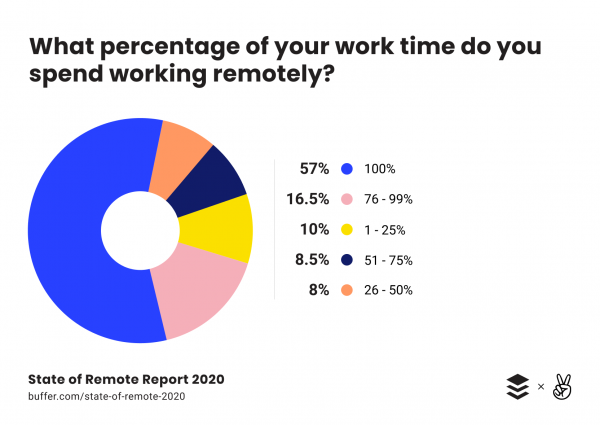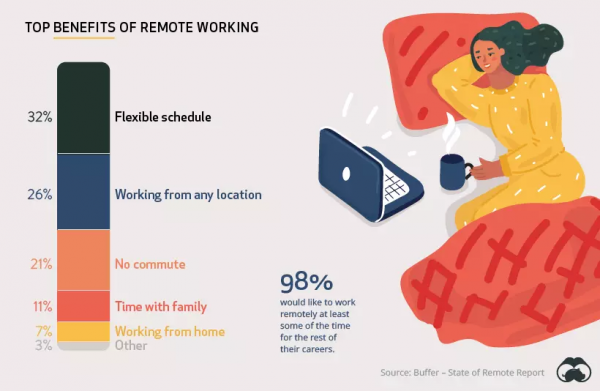If you had asked me back in January what I had expected my working situation to be today, I probably wouldn’t have anticipated that I would be fortunate enough to be working from the comfort of my own home. However, as many businesses continue their social distancing practices to keep their employees and customers safe during the COVID-19 pandemic, much of the workforce has been working from home (WFH), otherwise known as telecommuting, e-commuting, or working remotely.
Although there are certain aspects of working at the office that I miss at times, working remotely has proven to have several benefits for both myself, the worker, and Hiilite, the employing business over the past few weeks. In fact, based on recent studies and my personal experience, I firmly believe that telecommuting will play a massive role in how businesses operate and are structured moving forward.
This article will reveal why your employees may prefer a virtual office and why your business should be flexible in remote working.
What Is Telecommuting?
Before I explain why telecommuting can be so advantageous for both your employees and your business, it is important that you understand what telecommuting actually is.
In short, telecommuting is a fancy term that is used to describe the act of working remotely. Instead of traveling to the office, an employee who telecommutes, often called a teleworker, can work from a location that is not directly linked to their employing business. The person may work from their home, at a park, at their favourite coffee shop, or at their local library, for example.
While some employees may telecommute full-time, others may only work remotely for a portion of a given workweek. In this situation, the remainder of the week would be spent at the office. As a general rule, each telecommuting employee’s schedule should be communicated and agreed upon by management and the employee themselves.
According to a Buffer’s 2020 survey on remote work which included 3,500 individual remote workers across the globe, 57% of them are full-time telecommuters, 16.5% work remotely 76-99% of their employment, 10% spend 1-25% working remotely, 8.5% telecommute 51-75% of their employment, and 8% work remotely for 26-50% of their jobs.

Enabling employees to work remotely hasn’t always been very popular in business. In the past, employers were concerned that their remote workers would be less productive, more distracted, and more difficult to manage. However, as technology has progressed, programs such as Zoom and FaceTime have reduced (and nearly eliminated in some cases) the requirement for a physical meeting location. Employees are also able to work collectively through a shared online file such as Google Docs.

Although skeptics may not have loved the idea in the past, between 2005 and 2017, remote working in countries like the U.S. increased by 159%. Undoubtedly, the COVID-19 pandemic that we are experiencing today has caused this growth rate to accelerate even further over the past few months.
Remote Workers Are Happier
When you consider the convenience that your employees experience while working from home, a few advantages probably come to mind immediately. Personally, I’ve reaped great benefits from working remotely including dictating my working hours, getting additional rest, and being less distracted than I would normally be at my workplace.
Aside from pants being a completely optional garment for those working remotely, the top four benefits of remote working, according to a recent study, reportedly include a flexible working schedule, location flexibility, the elimination of daily commutes, and additional time spent with family.

Understandably, the convenience of working remotely has had a positive effect on telecommuters. Overall, telecommuters are happier with their employment than those who do not work remotely:
- 24 percent of people who work in traditional offices say they love their job
- 45 percent of people who work remotely say they love their job
- 98 percent of people would like to work remotely, at least some of the time, for the rest of their careers.
- 97 percent of people agreed that they would recommend remote work to their peers.
Remote Workers Are More Productive
As mentioned earlier in this article, managers were once concerned about the productivity and performance of telecommuters. However, you don’t have to be the head of an HR department to understand that happier employees are generally more productive and produce a higher quality of work than those who are unhappy. The proof is in the pudding (or in the statistics, in this case):
- Teleworkers are 35-40% more productive than their office counterparts.
- Teleworkers have a 4% higher output than non-remote workers.
Of course, there are other contributing factors to these statistics aside from simply an employee’s increased level of job satisfaction and overall happiness. By working away from the office, employees can be more productive because the distractions of an office space are eliminated, for example.
Due to the elimination of the worker’s required daily commute to the office, telecommuters report lower levels of stress and higher levels of energy. The commute is one of the most universally dreaded aspects of work itself for those in the working class and it can quickly lead to a reduction in morale among traditional commuting employees.
For individuals like myself, the classic hours of operation that many businesses continue to follow can be difficult to align with. Over the span of my life, I’ve found that my productivity is at its best between the early afternoon and later at night. By working remotely, I’m able to be flexible with my schedule and plan my working hours in a way that aligns more favourably with my hours of peak productivity. Remote working allows me to deviate away from the standard 9-5 work schedule and has proven to be beneficial for both myself and the Hiilite.
Telecommuting Saves Businesses Money
Whether you are a for-profit or a not-for-profit company, profitability should be at the centre of your business’ strategy. From my experience, I’ve seen many businesses make the mistake of focusing their attention on increasing their revenue while failing to consider the impact that their company’s expenses have on their bottom line. Although we can help you to achieve better results from your marketing efforts and help your business yield more revenue, transitioning to a telecommuter-friendly business structure can dramatically reduce your business’ expenses.
Telecommute work allows businesses to cut costs by reducing (if not entirely eliminating) expenses associated with office space, supplies, utilities, and employee accommodations. According to Ohio University, one company that allowed 100 employees to work from home saves $1 million dollars per year in expenses and $10,000 per employee per year. Similarly, an article by Forbes claimed that organizations save an average of $11,000 per year per part-time telecommuter, resulting in 21% higher profitability. In both cases, the financial savings were also accompanied by an increased level of employee productivity, employee satisfaction, and employee loyalty.
Teleworkers themselves can save $6,800 on expenses per year if they are no longer required to commute to a physical working location. Because the worker can save money while working remotely, a whopping 54% of employees in a survey even stated that they would change jobs in favour of one that offered them more flexibility, resulting in an average of 12% turnover reduction after a remote work agreement is offered. As employee turnover is reduced, onboarding costs fall and the business’ culture becomes healthier.
Hubstaff estimates that they save around $100,000 in leasing fees, in-house IT, utilities, and other expenses each year by working remotely. Other larger companies report much higher savings as a result of remote work. American Express, for example, reports annual savings of $10-15 million.
Why Your Business Should Be Flexible In Remote Working After The COVID-19 Pandemic
I cannot stress enough how I see business models being reformed following the Coronavirus pandemic. Remote work is being utilized by companies of all sizes with major names such as Google, Facebook, Amazon, and Twitter opting to extend their remote work structure for the foreseeable future. With so many companies encouraging their workers to practice social distancing by working from home, businesses and employees alike are undoubtedly experiencing the many benefits of telecommuting.
